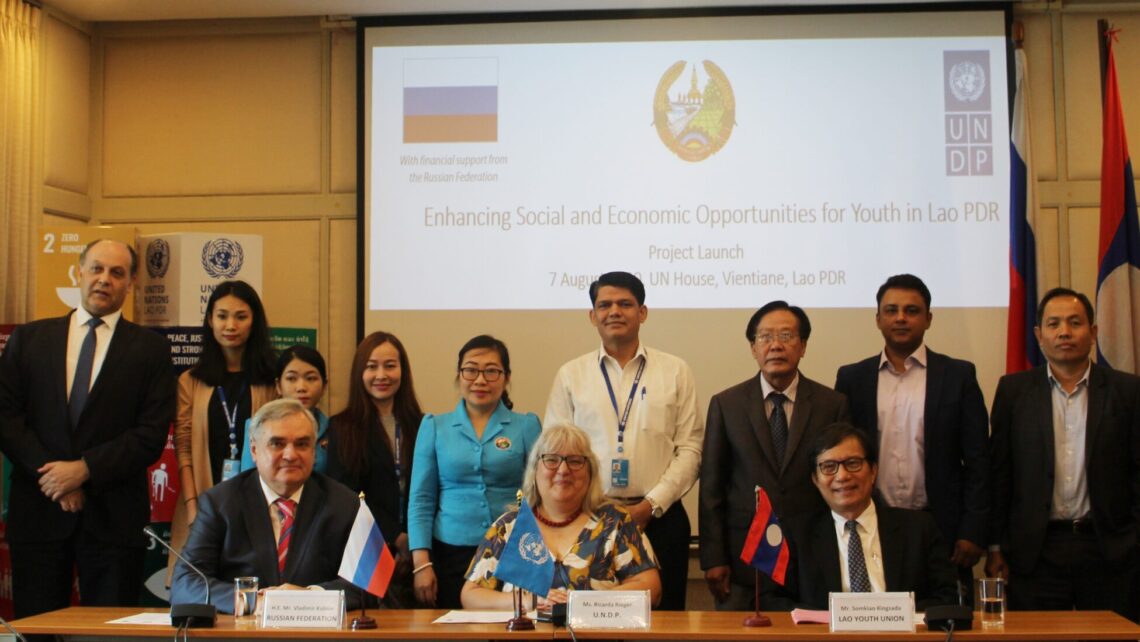Context:
Lao People’s Democratic Republic (Lao PDR) is a country with a population of 7.5 million. Approximately 60 of the population are under the age of 25, making it among the countries with the youngest populations in the Asia-Pacific region. Over the past decades the country has achieved significant success in expanding access to education, increasing youth access to schools and reducing poverty. However, human capital concerns persist, including a widening gap between supply and meeting the vigorous demand for high-skilled human resources. Other concerns include high rates of school dropout (particularly among teenage females at the secondary level), adolescent pregnancy, early marriage and child labour. Furthermore, with the country being a member of the ASEAN Economic Community, the demand for medium- and high-skilled employees is unlikely to be met until shortcomings in young people’s education levels and limited skill sets are effectively addressed.
Implementation of programme/ initiative:
The United Nations Development Programme (UNDP) Enhancing Social and Economic Opportunities for Youth in Lao PDR project was implemented between June 2020 and June 2022, funded by the Government of the Russian Federation with an allocated budget of US$ 1,500,000 million. The project aimed to create an enabling environment for youth (nationally defined as 15 to 30 year-olds) to reach their full potential and to be able to play an instrumental role in the country’s socioeconomic development through improved social and economic opportunities, with a special emphasis on youth employability and social participation. For the implementation of the project, UNDP partnered with the Lao Youth Union (LYU), the Lao Women’s Union (LWU), and the Ministry of Information, Culture and Tourism. The programme of the project had three objectives:
- Contribute to the execution of sectoral and national youth initiatives in specific provinces.
- Increase rural youth economic empowerment.
- Improve youth social engagement and involvement in decision-making processes.
Main challenges:
Figures postulated by Plan International in Lao PDR highlight that nearly 60 per cent of women aged 20—24 with no education are married before the age of 18, compared to 16 per cent of those with a secondary education. This hampers human capital development and reflects one of the main challenges for effective programme implementation which is inadequate knowledge and willingness on the side of many families to invest in the education and skill training of their children. Another challenge of the programme relates to the aforementioned figures regarding dropout rates and the pressure to get married, as the intended youth beneficiaries are often not easily
reached.
Results achieved:
The project carried out an assessment and analysis of local legislation to identify challenges and opportunities for social and economic involvement of youth in the country. The assessment emphasized the need of engaging disadvantaged youth, especially those from ethnic minorities and young women, at the local level. To address this and in collaboration with LYU, a model Youth Technical Vocational Education & Training center in Khammouan Province was established, targeted at marginal/disadvantaged youth with a specific focus on the agricultural sector and developing rural and agricultural livelihoods capacities.
Furthermore, one of the activities carried out during project implementation was enhancing social involvement through Community Radio which worked with key partners such as LYU, LWU, and the Ministry of Information, Culture, and Tourism to develop youth-led Community Radio Stations in Khammouan and Houaphan provinces. In addition, ethnic youth community volunteers, including people with disabilities and young women, were trained in radio production and management, with continual capacity development, such as acquiring specific new skills, and sharing knowledge at the individual and institutional levels.
Moving Forward:
With the programme focusing on maximizing opportunities, and attainment and provision of skill sets for youth, Lao PDR will need to expedite initiatives to improve education and training, as well as youth labour skills, define national skill standards, and encourage mutual recognition of qualifications. The project may be expanded and scaled up by actively mobilizing more resources. Furthermore, the project’s activities may find synergies with other UNDP projects, and the work of other UN agencies, and other Development Partners to ensure that there is no overlap or duplication, but also to collaborate in order to achieve maximum developmental impact and most effective resource use.
Replicability:
Some of the main lessons include establishing target regions and undertaking a careful mapping at the outset of any programme to ensure effective execution, along with conducting a situational evaluation of the target region or community. Other useful aspects are guaranteeing collaboration and partnership with various grassroots groups and local governmental entities to enhance the formulation of effective action plans for the target group and to carry out more successful interventions to address relevant issues.
References:
- https://www.undp.org/sites/g/files/zskgke326/files/migration/la/35bb18acd7fa1e73f29ac51065fba0e25bfa13519cd05339eae63e123fde0da8.pdf
- https://www.undp.org/laopdr/projects/enhancing-social-and-economic-opportunities-youth-lao-pdr
- https://plan-international.org/asia-pacific/case-studies/education-matters-removing-barriers-to-get-girls-educated-in-lao-pdr/
This good practice was kindly prepared by Ms. Yashashwi Adhikari.
Project Details
Date: February 16, 2023
